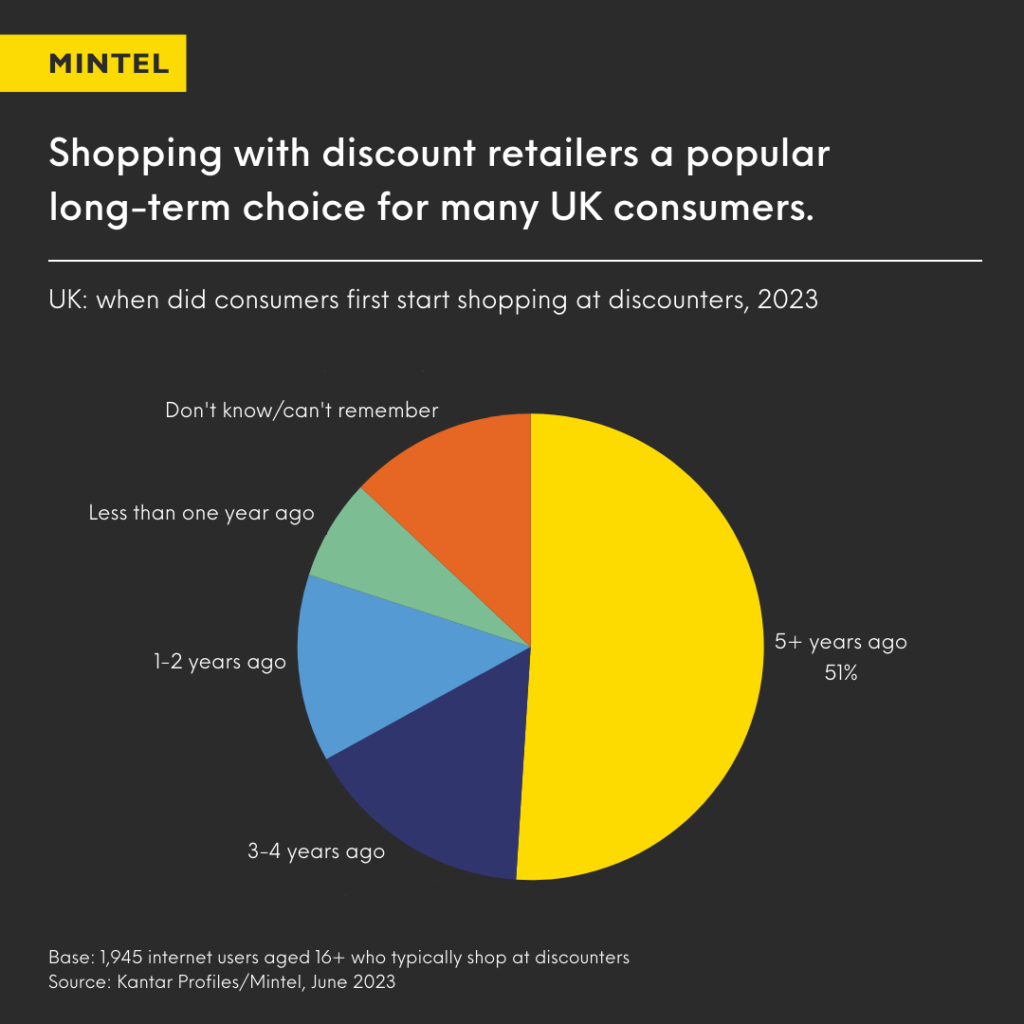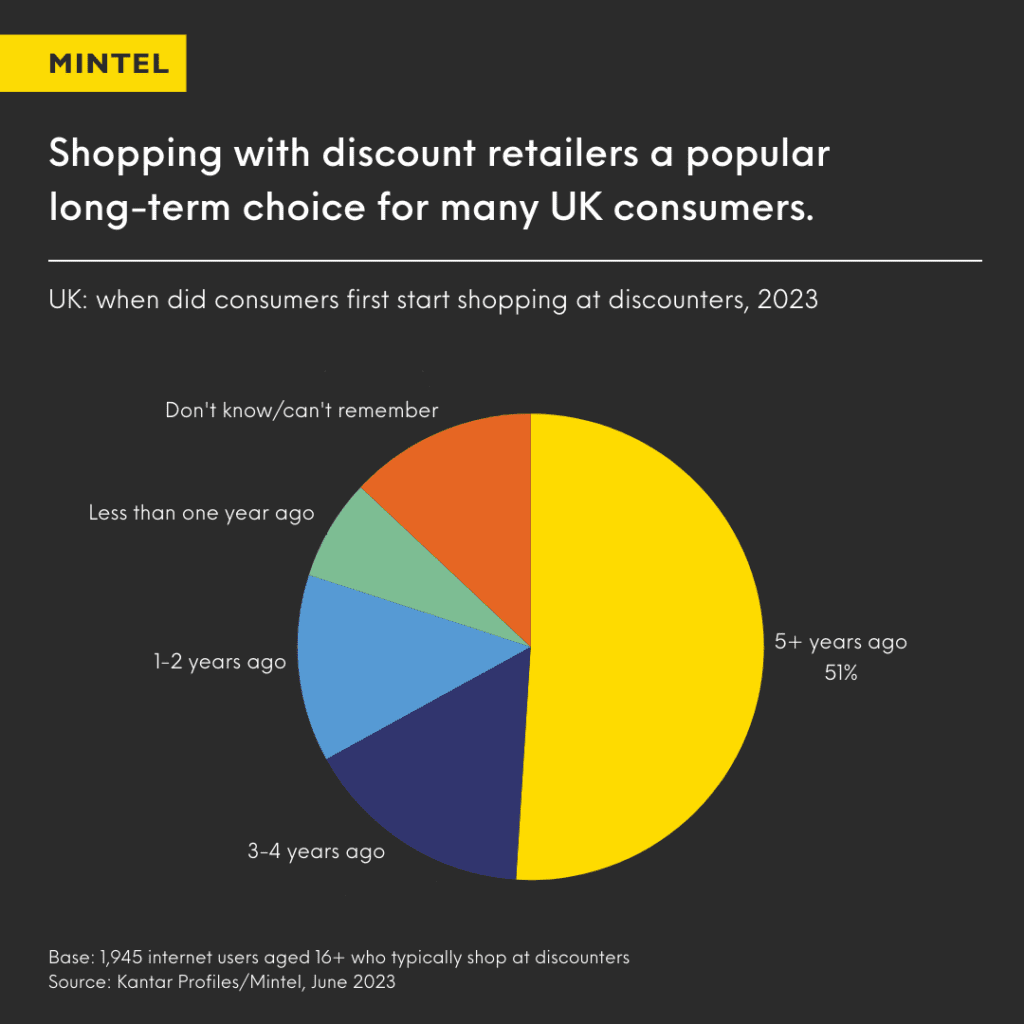For obvious reasons, value has been at the forefront of shoppers’ minds in recent years.
In the face of a global economic crisis, consumer grocery shopping habits have changed, and have become more value-conscious in response to inflation and the rising cost of living. In the UK, almost three-quarters of shoppers are spending more time finding the lowest prices. Similarly, in the US, over two-thirds of consumers agree that economic difficulties have caused them to reduce their spending. This value-driven behaviour has also been observed in India, where four in ten shoppers bought products solely based on low prices in 2023.
It is no surprise then, that as consumers looked for affordable alternatives, discount retailers have been performing remarkably well over the last few years. Mintel’s discount retail industry analysis shows that discount retailers in the UK have increased their market share by 8% since 2017. This growth has been mirrored across Europe. In Germany, discount retailers have also seen positive growth, with 40% of grocery sales coming from food discounters in 2023, and in Italy, the combined turnover of the top four discounters grew by 12.5% in 2023.
In the US, dollar stores have seen a similar increase in market size and consumer engagement. Since 2019, the US dollar store industry value has increased by almost 40%, and according to Mintel’s consumer research, around 9 in 10 American adults have shopped in a dollar store in the last year.


What is a Discount Retailer?
A discount retailer is defined as a retailer that primarily uses price as its defining feature, operating with extremely tight cost controls and focused buying to offer products at lower prices. These retailers generally maintain consistent product lines and are typically larger in scale to achieve the necessary economy of scale required for true discounting.
In the US, dollar stores are the most popular form of discount retailer. Dollar stores are defined as retailers selling deeply discounted merchandise including name brand and private label products such as food, household supplies, health and beauty care and more, typically ranging in price from $1-20. Some dollar stores are known as single-price stores, offering one price for all merchandise in stores.
Visit Mintel Store for Retail Market Research Reports.
What Does Improving Consumer Financial Resilience Mean For the Discount Retail Industry?
As consumer financial confidence returns, the substantial market growth that the discount retail industry has seen in recent years could be under threat. Over a quarter of UK shoppers say that having more money would make them less likely to shop at discount retailers. A fact that suggests a large number of discount retailers are using them out of necessity, and that price has been a significant influence on their shopping habits. As low prices become less sought after, discount retailers could suffer.
Value-conscious shopping habits are expected to persist, at least in the short term. However, in the long term, as value becomes less of a dominant consumer mindset, a significant challenge for discount retailers is attracting and retaining customers in a post-crisis economy. Fortunately, in this article, Mintel has identified several strategies which discount retailers can implement to continue their positive performance.
Discount Retail Industry Trends: Opportunities for Growth
1. Sustainability matters
As sustainability matters grow in importance for consumers, retailers will need to adapt to meet consumer expectations. Consumers expect discount retailers to take responsibility for their environmental impact and take action to improve sustainability, even with the more affordable store brand options. Almost a quarter of US consumers would like to see store brands with sustainable sourcing.
Communication is important and transparency is key. Consumers are wary of greenwashing and expect retailers to incorporate genuine sustainability initiatives into their business strategies. Mintel’s research reveals that consumers won’t stand for one-off initiatives, sustainability efforts need to become part of a retailer’s core identity to stop shoppers from ultimately heading elsewhere. One potential approach to enhance sustainability is through partnerships and collaborations with brands and third parties. One standout example of this is Loop, an established zero-waste company that provides reusable packaging to brands and retailers. Offering sustainable and reusable packaging is a quick and easy win for brands, and an effective way to increase customer appeal, given that over half of consumers in the UK believe that sustainability is the most important factor in food packaging.
However, despite sustainability’s increasing importance this does not necessarily mean that consumers will be willing to pay more for sustainable products, and discount retailers would be well-advised to remember why consumers chose to shop with them in the first place. Given the budget constraints many consumers continue to face, there is an expectation for discount retailers to offer sustainable products at competitive prices. Consumers in the US are less inclined to pay a premium for everyday items like food, drink and household goods, and many believe that companies should absorb some of the costs associated with sustainability due to their larger resources.
2. Loyalty is priceless
Loyalty has become a huge part of consumer grocery shopping trends. In the UK, eight in ten consumers are members of a retail loyalty scheme, and just under three-quarters of the consumers Mintel surveyed say that being a member of a loyalty scheme encourages them to shop with that retailer more often.
Fortunately, the discount retail industry is well-positioned when it comes to customer loyalty. In Ireland, discounters have been able to foster a loyal customer base, particularly among older consumers. Around six in ten Irish consumers over 55 have been shopping at discounters for more than five years. Many Irish consumers indicate they would continue shopping at discounters even if their financial situation improved. This suggests that loyalty is driven not just by price, but by the perceived value and quality of the products offered.
Discount retailers should take inspiration from traditional retailers and implement effective loyalty programs that can help retain customers by offering rewards and incentives for repeat purchases. The success of programs like Lidl Plus in the UK demonstrates their potential effectiveness in the discount sector.
3. Offer more, for less
In the US, almost a third of consumers cited poor quality as a reason for not shopping at a discount retailer. By investing in the quality of their private label products, discount retailers can offer consumers affordable alternatives to name brands without compromising on quality. This includes developing premium tiers within their private label ranges to appeal to quality-conscious shoppers. Furthermore, discount retailers should make efforts to clearly communicate any enhancements in product quality, either through marketing campaigns, in-store messaging, or through digital platforms.
Most importantly, discount retailers need to keep pace with the private label grocery trends set by traditional grocery retailers. Despite an ongoing focus on value, there is a trend towards premium private label offerings. Mintel’s Global New Products Database (GNPD) shows that numbers of premium private label launches have been growing since 2019. Highlighting that consumers are on the lookout for affordable luxury, and discount retailers are well positioned to offer it to them.
Expanded ranges are also likely to increase consumer interest. Over a third of discount shoppers in the UK believe that the product range in their chosen retailer is too limited. Offering a wider range of products, including those that cater to specific consumer needs or preferences, can help to keep discount retailers relevant.
4. Time to embrace ecommerce
Integrating technology solutions, such as mobile apps and online shopping platforms, can enhance the shopping experience and provide convenience to customers in the discount retail space.
Over four in ten German consumers shop for groceries online. As more consumers shift to online grocery shopping, there is a growing need for discount retailers to enhance their ecommerce capabilities. Just under a third of UK discount shoppers shop online, but achieving ecommerce success at a discount price can be challenging, meaning that brands may need to pivot away from the traditional model of online grocery shopping. Convenience is a major driver for shopping online, over half of US online grocery shoppers do so to save time. To honour this consumer preference, offering click-and-collect can be a simple way to improve convenience for consumers, and can benefit retailers further as it does not require the higher level of investment needed to offer wholly online shopping.
Mintel’s research unveils that discount retailers who have already established a foothold in the ecommerce space can also improve their offering by improving user experience and investing in technology to improve ecommerce capabilities. For instance, using AI for personalised recommendations and dynamic search can make the online shopping experience more engaging and efficient.
Looking Ahead With Mintel
Despite improving consumer financial confidence, discount retailers are in a strong position to secure future growth. However, as consumers’ personal finances improve, it is imperative that discount retailers offer more than just a good price in order to remain in competition with traditional retailers. Improving ecommerce capabilities and sustainability efforts are two avenues the discount retailers are well positioned to explore in order to prosper in an increasingly competitive retail environment.
Subscribe to Mintel’s free newsletter, Spotlight, to get exclusive content and insights delivered directly to your inbox.
24World Media does not take any responsibility of the information you see on this page. The content this page contains is from independent third-party content provider. If you have any concerns regarding the content, please free to write us here: contact@24worldmedia.com

